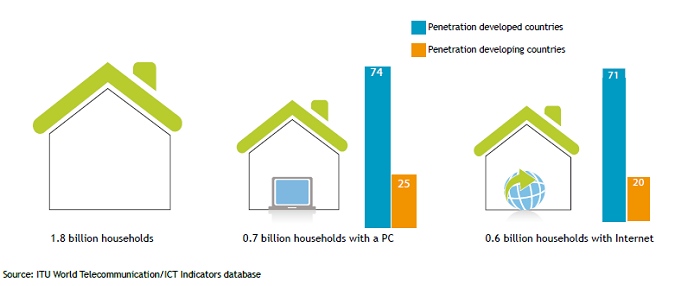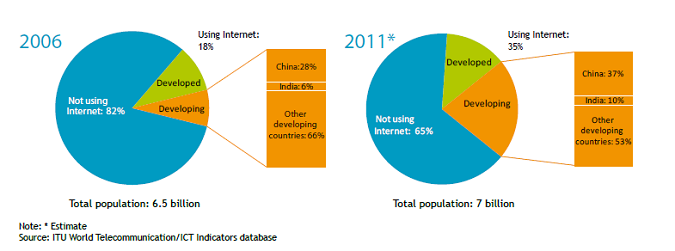Disconnected: 70 Percent of World Doesn’t Have Internet, Despite Rising Phone Usage
Surfing the web is still a luxury in most parts of the world due to a lack of Internet access in developing countries, where only 20 percent of people have the ability to get online, according to an international study on telephony by Swiss researchers.
At the end of 2010, only 30 percent of the world’s population had Internet access, according to the report published last Monday by the International Telecommunication Union. The Geneva, Switzerland-based organization estimates this number will reach 35 percent by the end of 2011.
“In most developing countries, households, schools, hospitals and other public institutions located outside the major urban areas are not yet connected to high-speed internet,” the study said.
With a large majority of people across the globe lacking web access, an ability that many in the developed world consider a necessity, cell phone-makers and service providers have a massive market to tap into.
As part of an effort with the United Nations’ Broadband Commission, the ITU announced its goal last week at a summit in Geneva to bring the Internet to twice as many people – 40 percent of households – in the developing world by 2015.
People in the far corners of the earth aren’t completely disconnected, though.
A population boom in the developing world that has boosted the global population to 7 billion this month has seen those countries’ mobile cellular telephone subscriptions increase nearly twice as fast in the past four years as in developed ones.
Sign up to receive The Snapshot, a free special dispatch from Laptop Mag, in your inbox.
The number of mobile cellular telephone subscriptions in the world has reached nearly 6 billion—a global penetration rate of 87 percent—after a boom in telephony in developing countries, ITU’s analysis found.
These phones are also helping some get Internet, too. When people in low-income countries are connecting online, it’s usually through mobile broadband connections. These types of connections, usually through cell phones, tablets or smart phones, have grown 45 percent annually from 2006 to 2010 and account for twice as many users as fixed broadband.
While developing countries have seen the most dramatic rise in phone usage, high-tech countries are still leading the way in telephony.
Korea was deemed the most highly developed country for information and communication technology, according to the researchers, who weighed factors like the number of houses with Internet access, the number of fixed telephone lines per 100 people and the technology skills of the inhabitants. Chad ranked last.
With Davey Alba


